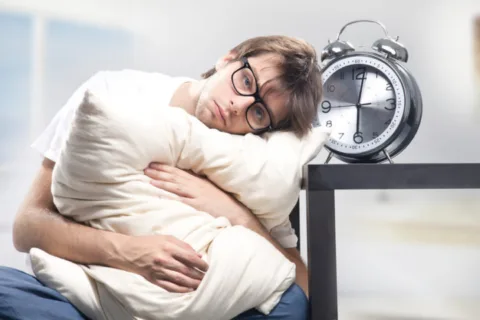Some of my first memories consist of lying awake at night, sleep eluding me until the early hours of the morning. I didn’t think much of it as a child. But as I grew older, lack of sleep became more and more of a problem. This happened periodically for so long that pinpointing a cause was difficult.
Insomnia is complex and varies from person to person.
Mine would occur in episodes — lasting weeks or months at a time — and then disappear after experimenting frantically with a number of treatments and proposed solutions. There were times I would go days functioning on only 1 or 2 hours of sleep, dreading nightfall and the hours I would spend lying awake.
Throughout these episodes, I tried a number of over-the-counter and prescribed sleep aids that both worked and didn’t work to varying degrees. I also tried more holistic remedies, and meditation, and lifestyle changes.
The process involved a lot of trial and error, but I learned a lot about insomnia over time and how to handle it.
I sleep much better nowadays, armed with an exhaustive arsenal of practices and remedies for tackling insomnia.
Insomnia Remedies To Help You Fall Asleep Do Work!
Lack of sleep is not something to take lightly.
Going several days without it can make you feel fragile, shaky, unfocused, depressed, and anxious — leading to severe trouble with your cognitive processes.
The stress that results from insomnia can take a toll on your immune system as well, becoming a factor that aggravates other illnesses. Doctors agree that this can result in a serious blow to overall health and well-being.
Due to this connection, treating insomnia is important. Don’t accept it as a normal part of your life!
But treating insomnia is no easy task. There are a number of causes — each influencing the best method of treatment.
In order to determine the best approach to sleep, you first have to determine what may be causing your insomnia.
What Causes Insomnia?
Determining the cause of insomnia can be incredibly difficult. There are often multiple factors influencing sleep trouble.
Once I accepted that I was prone to insomnia, I noticed that different behaviors and environmental factors led to sleepless episodes. Depending on the cause, I could employ a combination of different tactics that could help me fall asleep.
In the most simple and common cases, I found that my insomnia was related to my behaviors and routines. Some examples of insomnia-inducing behaviors include:
- screen time before bed
- naps throughout the day
- eating too soon before bed
- not getting enough exercise
- ingesting too much caffeine throughout the day
Sudden changes in routine and situation can also cause insomnia, as well as changes in medication and stress levels.
Luckily, sleep returns when your routine stabilizes or your body adjusts to the change. But stress is a bit trickier. Dealing with stress is often stressful itself, falling into the category of easier said than done. Insomnia and stress are closely related, and often the former won’t disappear until the latter is dealt with — which makes them a bad combo!
Related to stress, insomnia is also caused by biological factors triggered by mental health problems — such as depression and anxiety. Whenever I’m experiencing chronic anxiety, I find that my breathing is irregular and my heart rate high. These physical responses interrupt sleep cycles and make falling asleep difficult. Racing thoughts tend to result in a racing heartbeat. The worst thing about this is that the problem exacerbates itself, leading to more depression and anxiety from lack of sleep.
My experience with anxiety and insomnia resulted in a strange dilemma: the longer my worry kept me awake, the more anxiety and dread I felt at the idea of not sleeping. A cycle developed where anxiety caused insomnia, and recurring insomnia induced anxiety surrounding the idea of sleep. Breaking this cycle was difficult, but possible.
Any obstruction to breathing can cause insomnia too. This includes allergy and sinus problems — which I have found can keep me up at night and lead to an interrupted sleep cycle. Sleep apnea, or the obstruction of airways during sleep that interrupts breathing, also results in sporadic sleep.
Insomnia Treatment – Here’s How To Fall Asleep Fast
Once I had an idea of what was causing an insomnia episode, I could work on taking the necessary steps to fall asleep.
Since behavioral-based insomnia is the most common, I’ll talk about 2 methods for adjusting sleep-related behaviors first, including:
- How to adjust your behavior before bed.
- How to adjust your sleep environment.
To adjust my behavior before bed… I set a time limit on electronics: no screen time 1 hour before my designated bedtime. This means putting away my phone and laptop and picking up a book or listening to music instead. When I know that insomnia is becoming a problem, I avoid taking naps, instead try to do some small exercises throughout the day — such as jogging, biking, or simply going for a walk. This diverts excess energy that would otherwise go to racing thoughts. I time my dinners so they occur several hours before I fall asleep, or choose to eat lightly before bed. When I’m experiencing insomnia, I cut out caffeine entirely. In general, I try to not ingest any caffeine after noon passes, to avoid the onset of insomnia.
To adjust my sleep environment… I worked to create a comfortable sleep space for myself. This involved hanging up blackout curtains that prevented any trace of light from entering my bedroom — because I found any bit of light distracting. If sound bothers you, try using earplugs or soundproofing your bedroom in some way. Personally, it was the lack of sound that bothered me more, so I set up white noise. My favorite source for this was A Soft Murmur due to its customization, but a fan works just as well.
A sleep-friendly environment will vary for everyone, so experiment with your own bedroom to see what works best.
Managing stress levels is also an important key to treating insomnia, and there are several ways to go about reducing stress.
The best method for me, which is also related to the exercise component mentioned above, is yoga. I watched instructional videos for a few simple sun salutations on YouTube (routines that last only about 10 minutes and are easy to repeat) and began practicing these in the evening before bed. Not only does this help with muscle pain and tension, it also helps regulate breathing and lowers the heart rate.
Treating mental health problems separately will help solve insomnia, as well.
I spoke with my doctor about my insomnia and anxiety and we decided on a combination of cognitive behavior therapy and pharmaceuticals.
This solution will vary significantly from person to person, as everyone’s mental health concerns are unique to them. Talk to your primary care physician to come up with a plan that works for you. Cognitive behavior therapy is especially useful in tackling that awful anxiety-insomnia cycle that results in dread and behavior patterns that beget more anxiety. A good therapist can help you break those patterns and adjust your dysfunctional attitude toward sleep.
When all behavioral, environmental, and therapeutic measures fail, there are always pharmaceuticals.
When it comes to ingestible sleep aids, the best place to start is with the most basic and common sleep aid: melatonin. Our bodies naturally produce melatonin, so this is a very safe and natural solution. Melatonin tablets can be purchased at any pharmacy or supermarket, from 3mg to 5mg to 10mg. I usually start small and then increase the dosage as needed.
Over-the-counter sleep aids have not worked well for me, so I’ve tried several prescriptions that have had some success. Both Trazodone and Mirtazapine have worked fairly well — though I often need to pair them with exercise and other good sleep hygiene habits. In my most desperate instances of insomnia, I resorted to benzodiazepine prescriptions, such as Xanax or Ativan — though doctors are often hesitant to prescribe these, so they’re only a temporary solution.
What To Do If You Still Can’t Sleep
Insomnia is complicated and personal. Everyone experiences their own kind of insomnia, with its own mix of solutions.
Over the years I’ve managed to learn what triggers and solves my sleeplessness, but this has required a long process of trial and error.
Try a combination of solutions and see what sticks — hopefully before long, you will be sleeping easy. Often, a myriad number of solutions must be attempted before something works.
Remember to persevere — the right combination of sleep-inducing factors exists for you. If absolutely nothing works, do not hesitate to speak to a doctor about your insomnia.
https://www.youtube.com/watch?v=aG4UvWrjP9Y
Aaron Stevenson is a public educator, health freak, and blogger at Snoozeez, a source for many sleep related topics. He blogs about all things that are sleep related. This guy loves talking about sleep, but don’t disturb him while he’s doing it!





